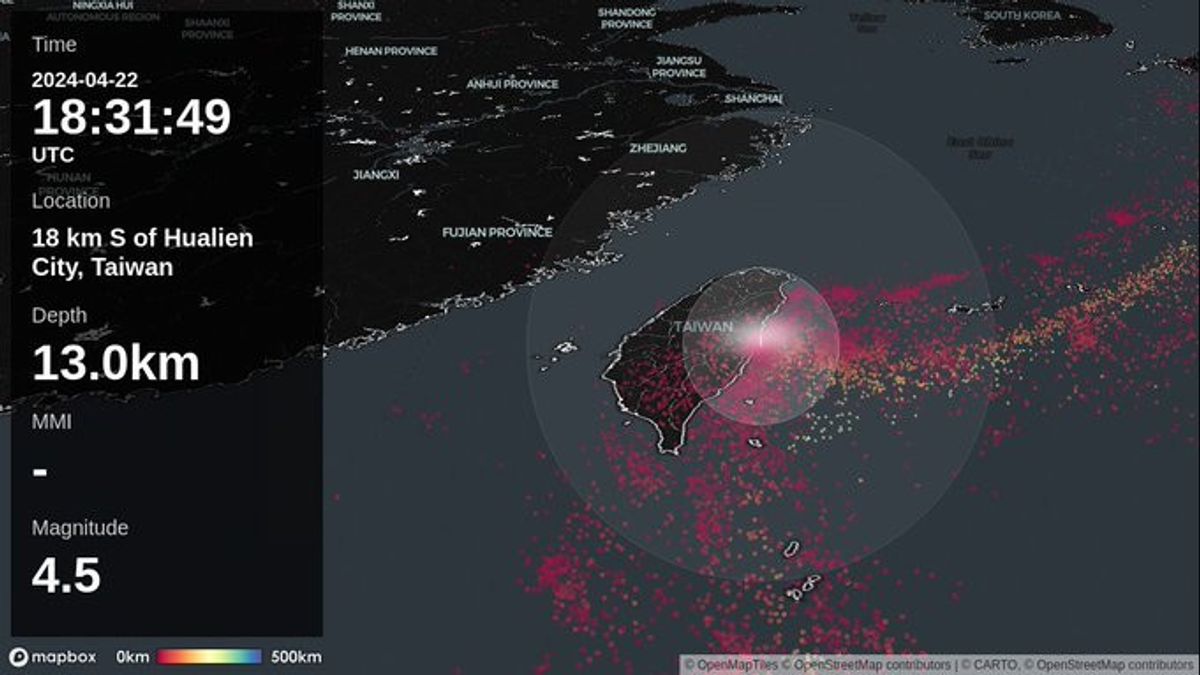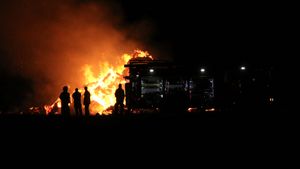JAKARTA - The earthquake warning mobile phone application has increased in popularity in Taiwan due to high demand from people who want to get extra seconds to take cover after more than 1,300 aftershocks rocked the island in the past month following previous major earthquakes.
Taiwan's east coast was hit by an earthquake measuring 7.2 on April 3, which killed 17 people. The aftershocks that have often occurred since - including more than 200 aftershocks in the 24-hour period from April 22 - have made many people feel uncomfortable.
Although the government has an automated earthquake warning system, which is sent in the form of text messages accompanied by a loud warning sound meant to sound seconds before the shock begins, the system could be inconsistent. In the Taipei capital, the system did not sound before the April 3 earthquake, which sparked criticism of the system.
This, along with increasing demand to remain more informed about the upcoming earthquakes, has helped increase the popularity of individual earthquake warning applications.
"What we offer is an early warning of an adjusted earthquake. You can set your own threshold," said Kuo Chen-yu, co-founder of the Disaster Prevention Information Platform, whose number of users has soared to nearly 370,000 from around 3,000 in recent weeks.
Lin Ruei, another founder of the app launched in 2022, said their app tracked seismic waves moving fast from more than 130 seismic sensors installed by their teams across the island to provide early warning to users. For example, he said, the app could give users in western Taiwan a more densely populated warning of up to 30 seconds for earthquakes from remote east coasts.
SEE ALSO:
"Some people may feel quite panicked with just an earthquake of intensity 2, so they can download our app," said Lin, a 17-year-old student. "If you get an early warning of 10 seconds and you move to a safe place, maybe it will be a rescue tool for you."
The official warning system run by the government is only given to mobile phone users in areas where large earthquakes with an estimated 4 or more intensity are expected, which authorities say is powerful enough to shift some of the furniture, cause cracks in walls, or disrupt electricity or water supplies.
Wu Chien-fu, Director of the Central Weather Administration Seismology Center, told Reuters it was pushing for the development of alternative tools that provide innovative tools for disaster response, adding that authorities are aware of the pressure to lower the official warning threshold, a system designed for larger earthquakes that is more likely to cause damage.
"We will consider whether to issue a warning to all Taiwan for a major earthquake," Wu said.
Nonetheless, many are interested in the additional functionality of the app being developed privately, such as an automatic flashlight switch before the shock begins, a recoil counter, or a warning for small earthquakes that do not trigger a government warning - a guarantee for those who wish to remain more alert to frequent aftershocks.
"The 30-second delay gave me enough time to mentally prepare, take a survival bag, and run into my son's room," wrote a user in a review of Taiwan's Earthquake Quick Alert, currently one of the most downloaded apps for iPhones on Taiwan that issued a countdown to the first wave of shocks.
The English, Chinese, Japanese, Arabic, and French versions are automatically generated by the AI. So there may still be inaccuracies in translating, please always see Indonesian as our main language. (system supported by DigitalSiber.id)


















